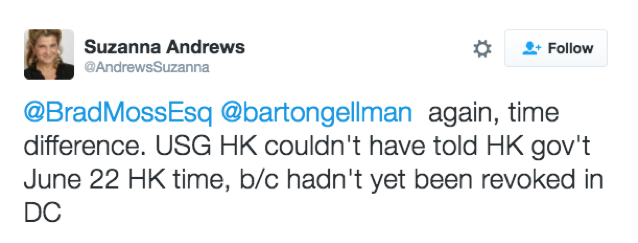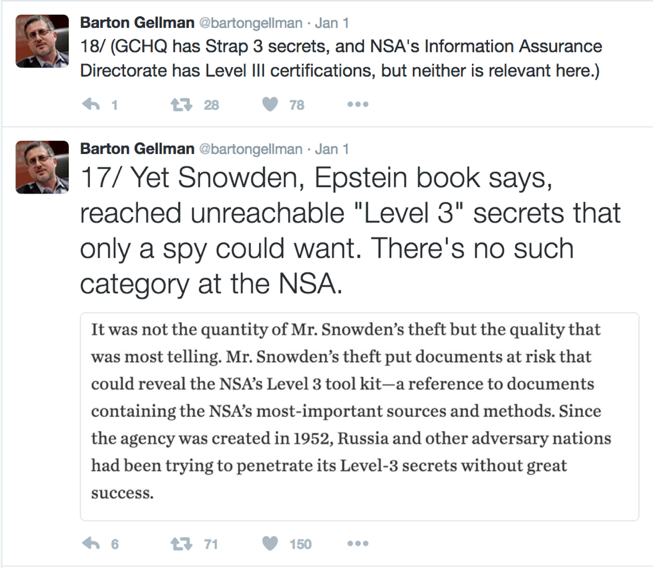The Fable of Edward Jay Epstein
In a recent pair of op-eds, one in the Wall Street Journal and the other in Newsweek, author Edward Jay Epstein purports to debunk “multiple lies” about Edward Snowden. Some of the most respected names in journalism, such as Pulitzer Prize winners Barton Gellman and Glenn Greenwald, have reviewed his arguments and found them to fall apart under even moderate scrutiny. Our own independent assessment confirms their judgment.
These op-eds preview Epstein’s forthcoming book, “How America Lost Its Secrets,” excerpted separately in another Newsweek piece. The New York Times has called the book “an impressively fluffy and golden-brown wobbly soufflé of speculation.”
Epstein attempts to smear Snowden as cooperating with the Russian government, even though several senior intelligence officials – including the former acting director of the CIA and the former deputy director of the NSA – have explicitly said otherwise. He neglects to mention that Snowden has gone on recordrepeatedly criticizing Russian policies, at great personal risk.
This disregard for the facts is only the tip of the iceberg. Moreover, it isn’t Epstein’s first flirtation with conspiracy theories. He is considered the father of the myriad theories surrounding the assassination of John F. Kennedy. Recently, he made waves when he claimed that Dominique Strauss-Kahn, the disgraced former head of the International Monetary Fund, had fallen victim to a political conspiracy when he was accused of sexually assaulting a hotel employee in New York.
Epstein makes so many embarrassingly false claims — described as “bizarro” by Gellman — that a full accounting is not possible in this limited space. But we provide here a few prominent examples of Epstein's unsupported claims and the facts behind them.
CLAIM: Edward Snowden brought documents to Russia with him because “two Kremlin insiders” said so in media interviews.
FACT: Snowden has consistently maintained that he destroyed all documents in his possession after providing them to journalists and before leaving Hong Kong. Robert Tibbo, the Canadian lawyer who arranged Snowden’s shelter, has confirmed that he witnessed Snowden destroying the documents when the two were together in Hong Kong. Glenn Greenwald has also corroborated this.
Furthermore, Epstein quotes selectively to make his point. He cites an NPR interview with a Russian official, Frants Klintsevich, who states in Russian that he’s only speculating. NPR omits this key phrase (“ya dumayu”) from the English translation, but it can be clearly heard in the original audio interview still available on NPR’s site. Klintsevich is also a dubious source in his own right: He recently said that it was “highly likely” that “NATO secret services” were behind the December 2016 assassination of a Russian ambassador in Turkey.


CLAIM: Edward Snowden “removed” 1.5 million documents.
FACT: U.S. government officials have repeatedly said they don’t know how many documents Snowden took. In February 2014, former Defense Intelligence Agency Director Michael Flynn told House lawmakers that he can only “assume that [Snowden] took” every document he could potentially reach. In May 2014, in an interview with the Australian Financial Review, former NSA Director Keith Alexander said, “I don’t think anybody really knows what he actually took with him, because the way he did it, we don’t have an accurate way of counting.” Epstein’s “1.5 million” is pure conjecture, based on how many documents Snowden could have accessed over the course of his entire career, not what evidence proves was removed.
CLAIM: Edward Snowden must have coordinated his travels with Russia because he left Hong Kong on June 23, 2013, after the U.S. government revoked his passport on June 22, as reported by ABC News.
FACT: ABC News did in fact report that the United States revoked Edward Snowden’s passport on June 22, 2013, and that Snowden flew to Russia from Hong Kong on June 23. However in the same article, ABC, as well as The New York Times, reports that it was unclear “whether the U.S. embassy was able to tell Hong Kong in time” about the passport before Snowden boarded his flight. As Suzanna Andrews, who thoroughly investigated the episodefor Vanity Fair, reminds us, it’s plausible that the time difference explains the discrepancy: Hong Kong is 13 hours ahead of the United States, meaning that when the U.S. revoked Snowden’s passport on the 22nd, it was already the 23rd in Hong Kong, Snowden’s day of departure.

Even if one believes the State Department properly notified Hong Kong of its desires, June 22 was a Saturday, and Snowden departed on Sunday morning. It is unreasonable to believe Hong Kong would have validated, approved, and communicated such a politically controversial request to all ports of entry and exit in less than 24 hours, particularly outside a typical government workweek.
Hong Kong authorities have consistently maintained that they had no legal basis to hold Snowden. At the time, they issued a statement confirming Snowden left Hong Kong on June 23 “through a lawful and normal channel.” The decision to allow Snowden to depart lay with Hong Kong authorities, not Russia. It is also possible that the Hong Kong authorities preferred to let Snowden travel rather than deal with pressure from the U.S. government.
Snowden has always said that he first learned of his passport revocation after he landed in Russia, which aligns with the reported timeline (and the fact that he ended up stranded in Moscow’s Sheremetyevo Airport for six weeks, without valid documents allowing him to continue on to his final destination). Russia was never Snowden’s final destination, and he ended up there only because his passport was revoked and he was unable to board his next flight.
Epstein also points to the fact that Snowden boarded his flight, operated by Russian airline Aeroflot, as a sign of Moscow’s complicity, but that simply doesn’t make sense – if Hong Kong wasn’t aware Snowden’s passport had been revoked, Aeroflot certainly wasn’t.
CLAIM: Snowden’s disclosures “sabotaged the war on terrorism.” Terrorists are now more likely to use end-to-encryption, making their communications harder to intercept.
FACT: This is flatly contradicted by the public record. It didn’t take the Snowden revelations to tip terrorists off to the fact that the U.S. government was monitoring their communications. Osama bin Laden stopped using phones as early as 1998. The only study to suggest harm was caused by the disclosures was funded by the CIA. Other reports have said conclusively that terrorists didn’tchange tactics in response to the disclosures.
Senior intelligence officials have repeatedly minimized claims of severe fallout from the Snowden disclosures. National Security Agency Director Michael Rogers told The New York Times, “You have not heard me as the director say, ‘Oh, my God, the sky is falling.’” Director of National Intelligence James Clapper has conveyed a similar message, Gellman has reported:
Clapper has said repeatedly in public that the leaks did great damage, but in private he has taken a more nuanced stance. A review of early damage assessments in previous espionage cases, he said in one closed-door briefing this fall, found that dire forecasts of harm were seldom borne out.
“People must communicate,” he said, according to one participant who described the confidential meeting on the condition of anonymity. “They will make mistakes, and we will exploit them.”
It’s absolutely true that the use of end-to-end encryption has expanded thanks to Snowden – when the public learned how easy it was for governments and data thieves to seize everyone’s private information, tech companies acted to patch those holes by tightening the security of their products. That’s something to be applauded, because it keeps all of us safer at a time of mounting fears for our cyberdefenses. Even Rogers has called encryption “foundational to the future.” Epstein clearly disagrees.
CLAIM: Edward Snowden denied being debriefed or even meeting with any Russian officials after he arrived in Moscow.
FACT: This is patently false. When testifying to the European Union in March of 2014, Snowden was explicitly asked whether Russian secret service had approached him when he arrived in Moscow. He answered, “Of course.” He further explained that because he had not taken any documents with him from Hong Kong and was accompanied by a journalist at all times, eventually the intelligence service realized they were “out of luck.” Again, this lines up with the fact that upon landing in Russia, Snowden was left to spend the next 40 days in Sheremetyevo Airport. No government would treat its spies so poorly.
What is true, however, is that senior American intelligence officials have explicitly stated they don’t believe Snowden has cooperated with the Chinese or Russian government. That includes Michael Morell, the former acting director of the CIA, and John C. Inglis, the former deputy director of the NSA, who was involved in the agency’s leak investigation.
CLAIM: Snowden’s Hong Kong whereabouts don’t line up, and the U.S. government possesses a surveillance photo of him entering the Russian Consulate building before he met with journalists in Hong Kong.
FACT: This claim, that Snowden went to the Russian Consulate in Hong Kong before meeting with the journalists at the Mira Hotel, appears in a 2014 op-ed and in the forthcoming book. Epstein argues that Snowden checked in to the Mira Hotel on June 1, not in late May as previously claimed. That’s simply not true. Snowden indeed stayed at the Mira during the period in question, under his own name and using his own credit cards. This theory has never been repeated by any credible reporter or newspaper.
Even a recently released report by the House Permanent Select Committee on Intelligence, written with full access to the sum of the United States’ classified information, doesn’t mention this conspiracy theory. That’s because the U.S. government, which can easily access Snowden’s credit card records, would have quickly confirmed that Snowden’s account of his time in Hong Kong was true. Anyone familiar with the depth of the U.S. government’s dissatisfaction with Snowden’s positive public image knows that if a surveillance photo of Snowden entering a Russian diplomatic facility existed, it would be on the front page of the New York Times.
CLAIM: The revelation that the NSA was spying on German Chancellor Angela Merkel proves Snowden took documents with him to Russia, since they weren’t in the archive received by the journalists in Hong Kong.
FACT: The information about the surveillance of Angela Merkel – and other German officials – did not come from Snowden. Der Spiegelnever named its source for the story (whereas they named Snowden as the source for plenty of others), attributing it instead to “SPIEGEL research.” Bild am Sonntag attributed further reporting to a “high-ranking NSA employee in Germany.” Renowned security expert Bruce Schneier explains further here.
CLAIM: Snowden got his hands on the NSA’s “Level 3” secrets – the most valuable in its arsenal, revealing its most critical sources and methods.
FACT: There is literally no such thing.

Unsurprisingly, Epstein fails to mention the deluge of benefits triggered by the Snowden disclosures: the court rulings against the NSA’s bulk collection of Americans’ phone records, congressional reform that checked the NSA’s powers for the first time in decades, executive branch reforms to protect foreigners from warrantless spying, multiple European rulings limiting mass surveillance, and more. He also ignores Timothy Edgar, the formerdirector of privacy and civil liberties for the White House National Security Staff, who has argued that Snowden’s disclosures made the NSA more effective, and who has joined the call for President Obama to pardon Snowden.
With enough bad faith, anyone can bend the truth to suit their bias. But when it comes to Snowden, the record is clear. Poorly researched conspiracy theories aren’t going to change that.
posted January 9, 2017